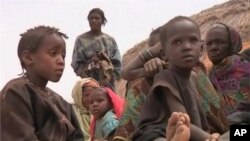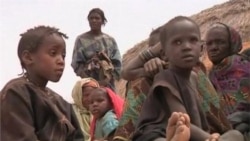The U.N. World Food Program said time is running out to prevent the full impact of the food crisis in Africa’s Sahel region. It said a donor funding shortfall of hundreds of millions of dollars could soon affect emergency aid programs.
WFP West Africa spokesman Malik Triki said food crises in the Sahel have become more frequent in recent years – but not like this.
“This current food crisis in the Sahel is one of the most complex and widest reaching food crises to hit the Sahel of West Africa in living memory. Whereas the 2005 and 2010 food crises hit mainly two countries – in Niger and Chad – this current crisis has hit in no less than 8 countries from Mauritania all the way to Chad,” he said.
Desperation in Niger
“I’ve been to areas where some communities are reduced to eating wild plants, wild berries. Things that normally animals would eat. And they have no other way of feeding themselves and their children. So you could say that technically in certain parts of the Sahel people are desperate and have nothing, literally nothing, left to eat, but wild leaves,” Triki said.
The World Food Program estimates up to 15 million people are affected. But reaching them with food aid can be difficult.
“Many of the countries are landlocked countries,” he said, “So the ability to move food in time to the people who need it most is constrained by the fact that we cannot move it as quickly as we hope for. We need something between 3 months and 4 months as a lead time to move the food. So what we do is to preposition the food closer to the areas where the people need it most.”
And It’s a very expensive humanitarian operation.
“This operation costs at least $790 million. And we still have a shortfall of around $360 million. Obviously, many, many countries and many donors have come forward and helped us, but we still have that shortfall. And we urgently need more donors to come forward to help us plug that shortfall,” he said.
The crisis is blamed on a number of factors – a lack of investment in agriculture, a rapidly growing population and climate change, which has brought drought and floods, as well as erratic seasonal rains.
Fleeing conflict
Conflict adds to the problem. Triki says fighting in northern Mali has created a refugee crisis to go along with the food crisis.
“There are at least 160,000 Malians who fled their country into neighboring countries like Niger, Burkina Faso and Mauritania. And a further 200,000 Malians have been displaced within their own country. And those figures are expected to increase. When these Malians leave their own country and seek refuge into other countries, they are hosted by communities in Niger, Burkina [Faso], Mauritania, who are vulnerable themselves – who themselves are finding it very hard to cope,” he said.
Triki described humanitarian efforts as a race against time. He says millions of children and pregnant women are at risk of malnutrition. He warned if the situation worsens, many of them could die. The WFP began sounding the alarm about the Sahel last October.
WFP West Africa spokesman Malik Triki said food crises in the Sahel have become more frequent in recent years – but not like this.
“This current food crisis in the Sahel is one of the most complex and widest reaching food crises to hit the Sahel of West Africa in living memory. Whereas the 2005 and 2010 food crises hit mainly two countries – in Niger and Chad – this current crisis has hit in no less than 8 countries from Mauritania all the way to Chad,” he said.
Desperation in Niger
“I’ve been to areas where some communities are reduced to eating wild plants, wild berries. Things that normally animals would eat. And they have no other way of feeding themselves and their children. So you could say that technically in certain parts of the Sahel people are desperate and have nothing, literally nothing, left to eat, but wild leaves,” Triki said.
The World Food Program estimates up to 15 million people are affected. But reaching them with food aid can be difficult.
“Many of the countries are landlocked countries,” he said, “So the ability to move food in time to the people who need it most is constrained by the fact that we cannot move it as quickly as we hope for. We need something between 3 months and 4 months as a lead time to move the food. So what we do is to preposition the food closer to the areas where the people need it most.”
And It’s a very expensive humanitarian operation.
“This operation costs at least $790 million. And we still have a shortfall of around $360 million. Obviously, many, many countries and many donors have come forward and helped us, but we still have that shortfall. And we urgently need more donors to come forward to help us plug that shortfall,” he said.
The crisis is blamed on a number of factors – a lack of investment in agriculture, a rapidly growing population and climate change, which has brought drought and floods, as well as erratic seasonal rains.
Fleeing conflict
Conflict adds to the problem. Triki says fighting in northern Mali has created a refugee crisis to go along with the food crisis.
“There are at least 160,000 Malians who fled their country into neighboring countries like Niger, Burkina Faso and Mauritania. And a further 200,000 Malians have been displaced within their own country. And those figures are expected to increase. When these Malians leave their own country and seek refuge into other countries, they are hosted by communities in Niger, Burkina [Faso], Mauritania, who are vulnerable themselves – who themselves are finding it very hard to cope,” he said.
Triki described humanitarian efforts as a race against time. He says millions of children and pregnant women are at risk of malnutrition. He warned if the situation worsens, many of them could die. The WFP began sounding the alarm about the Sahel last October.






